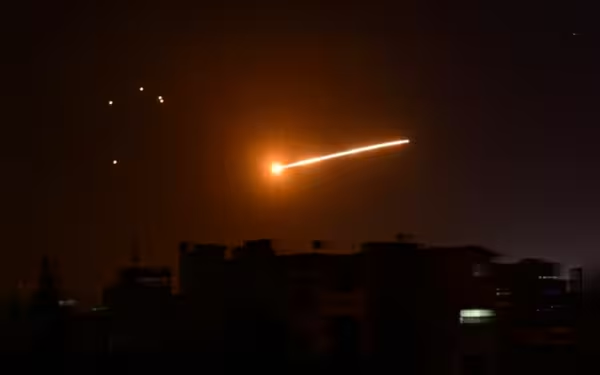Saturday, November 16, 2024 05:35 PM
Syria Intercepts Hostile Targets Amid Israeli Air Strikes
- Syrian air defense intercepts Israeli air strikes.
- Israeli strikes target military sites in Syria.
- Humanitarian crisis worsens as civilians flee conflict.
 Image Credits: brecorder
Image Credits: brecorderSyria's air defense intercepts hostile targets amid escalating Israeli air strikes, exacerbating the humanitarian crisis in the region.
In recent years, the conflict in Syria has drawn significant international attention, particularly due to the involvement of various foreign powers. One of the most notable players in this ongoing crisis is Israel, which has conducted numerous air strikes in Syria since the civil war began in 2011. These strikes are often aimed at military targets, especially those linked to Iran and its allies, including the Lebanese group Hezbollah. The situation remains tense, with the Syrian air defense systems frequently responding to what they describe as "hostile targets" in their airspace.
On a recent Sunday evening, Syrian state media reported that the air defense was actively intercepting these "hostile targets" in the central region of the country. This phrase is typically associated with Israeli air strikes, which have become a common occurrence in the war-torn nation. The official SANA news agency stated, "Our air defense systems are intercepting hostile targets in the airspace of the central region." This indicates a heightened state of alert and readiness among Syrian forces.
According to reports, the Israeli strikes targeted specific military sites, including a "weapons depot south of Homs and a rockets depot in the eastern Hama countryside." These locations were confirmed to belong to the Syrian army, highlighting the ongoing military engagements in the area. Additionally, earlier on the same day, an Israeli strike reportedly hit trucks that were transporting aid for Lebanese citizens, resulting in injuries to three aid workers. This incident underscores the complex humanitarian situation in the region, where military actions often intersect with civilian needs.
Furthermore, on the preceding Friday, Lebanon reported that an Israeli air strike on the Syrian border had disrupted the main international road connecting the two countries. This development is significant as it reflects the broader implications of the conflict, affecting not only military operations but also the daily lives of civilians in both Syria and Lebanon.
Since the onset of the Syrian civil war, Israel has conducted hundreds of air strikes, primarily targeting military positions and groups backed by Iran. While Israeli authorities typically refrain from commenting on individual strikes, they have consistently maintained that they will not permit Iran to expand its influence in Syria. The frequency of these strikes has notably increased in recent days, particularly in areas close to the Lebanese border, as tensions continue to rise.
In the past week alone, tens of thousands of people have fled into Syria, escaping the heavy Israeli air strikes on Lebanon. This mass movement of people highlights the dire humanitarian crisis that has emerged as a result of the ongoing conflict. As the situation evolves, it is crucial for the international community to remain vigilant and responsive to the needs of those affected by the violence.
The ongoing conflict in Syria, marked by Israeli air strikes and the response of Syrian air defenses, continues to create a complex and dangerous environment. The humanitarian implications are profound, as civilians bear the brunt of military actions. Understanding the dynamics of this conflict is essential for fostering dialogue and seeking peaceful resolutions that prioritize the safety and well-being of all affected populations.













